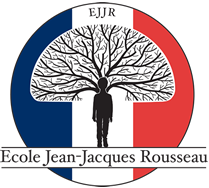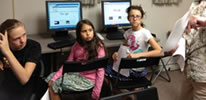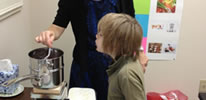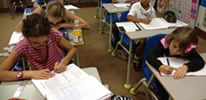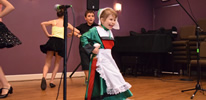Grade 1 and 2 are called in the French system Cycle 2 or “cycle des apprentissages fondamentaux” (First Cycle acquisition of fundamental skills). A combined method approach based on research concluding that different people learn to read in different ways, and perhaps some of us learn in more than one way. They are taught to write in cursive and to read all written forms. Language skills and oral expression are high priorities. A significant part of every school day is devoted to reading, poetry, creative writing, formal composition, speech and spelling.
The ‘French’ Teaching of Math
Our teaching of Mathematics is one of the point of pride for our Program.: Following the French System, our primary Years students are early exposed to a wide range of mathematical concepts: geometry, addition, subtraction and multiplication, algebra, fractions, the decimal system, etc. Each year these mathematical concepts are expanded and students’ comprehension deepens. Logic and expression are always prioritized. Calculating the correct answer is not sufficient; a student must explain how the answer was obtained, and why. Logic and the ability to articulate one’s reasoning are emphasized in every grade and field. Multiple-choice and true/false questions are virtually nonexistent. In all subjects, students are required to develop answers in thoughtfully organized essay form. A Math proficiency test has shown that our students to be up to two years in advance than some of their peers. The students learn study methods which they will use through high school and later in university.
The language Arts and Literature
The language Arts and Literature curriculum focuses on a full range of writing experiences, a broad spectrum of literature, and the refinement of oral and presentation skills. Skills are developed through the study of the literature and cultures of early civilizations, as well as through folk tales, ancient myths, novels, poetry, historical texts, and media articles. Starting Grade Four, Five and the beginning of middle school, a focus is on mastering the narrative mode. Descriptive, persuasive, and informative modes are generally studied. Students continue to do major research papers. Through written and oral reports, they practice grammar and writing skills, and develop confidence in their speaking abilities. Our primary objective is to develop critical thinking and communication skills, and a strong interest in Literature.
Discover the World – History & Geography
Discover the World is a French subject taught in Cycle 2, as a perquisite to the upper classes subject of History and Geography. It combines two modules; Space and Time. Students of Grade 1 and 2 develop important skills in time and space knowledge, about and around the world. These important skills are constructed from simple situations of everyday life along with near and known environment to a larger scale. Students conduct investigations about time and space that lead them to describe their observations and master a scientific vocabulary essential to the upcoming courses in Grade 3 and up.
Following ‘Discover the World’ Module, this course combines the two disciplines; World History & world Geography. In history, students are expected to understand the purpose of knowing history and develop a worldwide appreciation of culture, religion, law, social structure, and politics. History starts with the study of History of Space & Time and in Grade 1 and 2. History Lessons begin with a study of pre-history and early man, continue through ancient civilizations and extend to our twentieth century world. Geography lessons focus on themes: physical and climatic characteristics of the world, human environment and interaction, migration and population, and regions and diversity in landscapes. The aim is to give students the keys to understanding the contemporary world by studying its historical heritage and its modern geography.
Science
The French teaching of science in cycle 2 called also “Sciences Experimentales” lays a scientific foundation for the upper levels in the subject. In lower elementary levels, the teaching of experimental sciences and technologies teaches students to be responsible towards the environment, the living world, to health. In cycle 2, in combination with the study of space and time, the teaching of science uses an investigative approach based on 50 questions and hypothesis covering air, water, the living world of plants and animals, energy, matter, objects, electricity and the human body. Later on, in cycle 3, the French teaching of science introduces the classes to more advanced experimental sciences and technology.
Visual Arts (Arts Plastiques & Visuels) & History of Arts
Visual Arts: An important part of our French curriculum is dedicated to the teaching of the Arts. From preschool, students are exposed to a wide range of art forms from collage to learning about a specific painter, sculpture etc.. From Cycle 1, students focus on the study of the Arts of the Daily Life. In this course, through a wide range of projects using different tools and materiel, students learn about painters, sculptors, plastician artists, who had the power to capture momentary quality of everyday life such as Caillebotte, Munch, Dubuffet, Matisse, Modigliani etc…The study of the Arts deepens in the upper levels in elementary and middle school levels with the additional study of the four Art modules: Arts of Space, Arts of Sound, Arts of Language, and Arts of the Live Show.
History of Arts: We believe that the teaching of Art offer rich means of broadening our students’ experience and help shape their perspective on a wealth of subjects. For children, learning about Arts helps develop their imaginations, and encourages their ability to think creatively. These benefits spread to other areas of the child’s mind, refelcting in greater problem solving and reading comprehension skills as well as better analytical thought processes. Our curriculum of History of Arts is divided six sections studied throughout the Primary years program.
 French School of Austin French program is a French Dual Language Immersion program designed for students who start their full-time French education at a preschool or kindergarten level and fluent in French by the sixth grade, and who wish to pursue wit the school French Middle school program. This bilingual preparatory program follows the guidance of the French Ministry of Education and the Texas Education Agency. All subjects are taught in French to the exception of the English courses ( English Language Arts and Singapore Math).
French School of Austin French program is a French Dual Language Immersion program designed for students who start their full-time French education at a preschool or kindergarten level and fluent in French by the sixth grade, and who wish to pursue wit the school French Middle school program. This bilingual preparatory program follows the guidance of the French Ministry of Education and the Texas Education Agency. All subjects are taught in French to the exception of the English courses ( English Language Arts and Singapore Math).